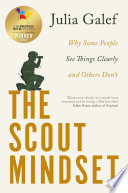

The book introduces the concept of two distinct mindsets: the scout mindset and the soldier mindset. The scout mindset is characterized by a desire to seek the truth, gather information, and understand the world as it is, without bias or preconceived notions. In contrast, the soldier mindset is defensive, focusing on protecting one’s beliefs and opinions from challenge. This idea lays the foundation for the entire book, as the author argues that adopting the scout mindset allows individuals to navigate life more effectively, make better decisions, and foster personal and societal growth. By recognizing when we are in soldier mode, we can consciously shift to a scout mindset, opening ourselves up to learning and growth.
Continue readingCuriosity is a central theme in 'The Scout Mindset.' The author emphasizes that a curious mindset encourages exploration and learning rather than defensiveness. When we approach situations with curiosity, we are more likely to ask questions, seek out new information, and understand different perspectives. This openness to learning can lead to better problem-solving and innovation. The book provides various strategies to cultivate curiosity, such as questioning assumptions, engaging with diverse viewpoints, and embracing uncertainty. Ultimately, fostering curiosity can transform how we interact with the world, leading to richer experiences and deeper understanding.
Continue readingIn a rapidly changing world, embracing uncertainty and complexity is crucial. The author argues that the scout mindset allows us to accept that not everything is black and white, and that ambiguity can be a source of growth. By acknowledging the complexity of situations, we can avoid oversimplifying issues and making hasty judgments. The book encourages readers to be comfortable with not having all the answers and to see uncertainty as an opportunity for exploration rather than a threat. This mindset shift can lead to more nuanced thinking, better decision-making, and a greater appreciation for the intricacies of life.
Continue readingFeedback is an essential component of the scout mindset. The author discusses how constructive feedback can be a valuable tool for growth and learning. However, many people fear criticism and may react defensively when receiving feedback. The book emphasizes the importance of viewing feedback as an opportunity to improve rather than a personal attack. By actively seeking out feedback and being open to it, individuals can enhance their skills, refine their understanding, and ultimately become more effective in their pursuits. The author also provides practical tips for giving and receiving feedback in a constructive manner.
Continue readingPerspective-taking is a key skill in developing a scout mindset. The author highlights the value of understanding others' viewpoints, especially in disagreements or conflicts. By consciously trying to see things from another person's perspective, we can foster empathy and reduce hostility. This practice not only enhances our relationships but also enriches our understanding of complex issues. The book offers techniques for improving perspective-taking skills, such as active listening and engaging in conversations with an open mind. By embracing this practice, we can create a more collaborative and understanding environment.
Continue readingConfirmation bias is a cognitive bias that leads individuals to favor information that confirms their existing beliefs while disregarding contradictory evidence. The author discusses how this bias can hinder our ability to think critically and make informed decisions. The scout mindset encourages individuals to actively challenge their assumptions and seek out disconfirming evidence. The book provides strategies for overcoming confirmation bias, such as diversifying information sources and engaging with opposing viewpoints. By recognizing and mitigating confirmation bias, we can enhance our decision-making processes and develop a more accurate understanding of the world.
Continue readingThe book concludes with practical applications of the scout mindset in various aspects of life, including personal relationships, professional settings, and societal issues. The author discusses how adopting a scout mindset can lead to improved communication, collaboration, and problem-solving. By applying the principles of curiosity, perspective-taking, and openness to feedback, individuals can navigate challenges more effectively and contribute positively to their communities. The book encourages readers to integrate the scout mindset into their daily lives, fostering a culture of learning and growth.
Continue readingThe reading time for The Scout Mindset depends on the reader's pace. However, this concise book summary covers the 7 key ideas from The Scout Mindset, allowing you to quickly understand the main concepts, insights, and practical applications in around 21 min.
The Scout Mindset is definitely worth reading. The book covers essential topics including The Scout vs. Soldier Mindset, The Importance of Curiosity, Embracing Uncertainty and Complexity, providing practical insights and actionable advice. Whether you read the full book or our concise summary, The Scout Mindset delivers valuable knowledge that can help you improve your understanding and apply these concepts in your personal or professional life.
The Scout Mindset was written by Julia Galef.
If you enjoyed The Scout Mindset by Julia Galef and want to explore similar topics or deepen your understanding, we highly recommend these related book summaries:
These books cover related themes, complementary concepts, and will help you build upon the knowledge gained from The Scout Mindset. Each of these summaries provides concise insights that can further enhance your understanding and practical application of the ideas presented in The Scout Mindset.